
Freyer's pug is a moth of the family Geometridae. The species can be found in Europe, east to the Urals, the Russian Far East, Kazakhstan and China. It is also found in North America.
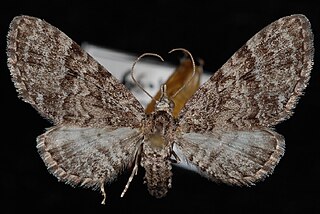
Eupithecia ornata is a moth in the family Geometridae. It is found from British Columbia and Alberta, south to California, Arizona and Nevada.

Eupithecia ericeata is a moth in the family Geometridae first described by Jules Pierre Rambur in 1833. It is found in most of southern Europe and the Near East.

Eupithecia cimicifugata is a moth in the family Geometridae first described by Pearsall in 1908. It is found in North America, including Alberta, Ontario, Saskatchewan, Kentucky, Maryland and South Dakota.
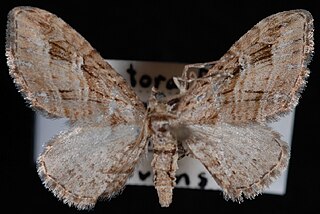
Eupithecia niphadophilata is a moth in the family Geometridae first described by Harrison Gray Dyar Jr. in 1904. It is found in North America from British Columbia and western Alberta south to New Mexico.
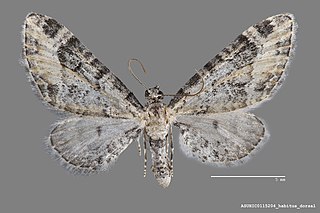
Eupithecia agnesata is a moth in the family Geometridae first described by Taylor in 1908. It is found in North America from California through Wyoming, Oregon and Washington to British Columbia.
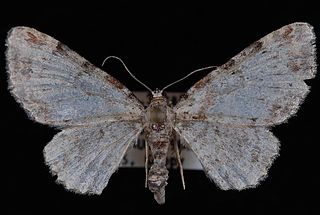
Eupithecia mutata, the spruce cone looper or cloaked pug, is a moth in the family Geometridae. The species was first described by Pearsall in 1908. It is found in the northern Atlantic and New England states in North America. In Canada, the range extends from Nova Scotia to northern Ontario.
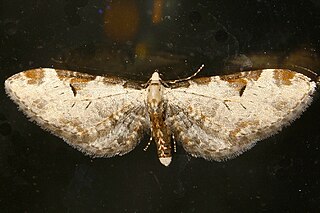
Eupithecia nevadata is a moth in the family Geometridae first described by Alpheus Spring Packard in 1871. It is found in western North America.

Eupithecia longipalpata is a moth in the family Geometridae. It is found from coastal British Columbia south to California.
Eupithecia sabulosata is a moth in the family Geometridae first described by James Halliday McDunnough in 1944. It is found in the US state of California.
Eupithecia macrocarpata is a moth in the family Geometridae first described by James Halliday McDunnough in 1944. It is found in the US state of California.
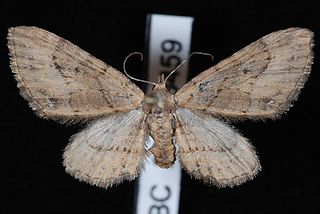
Eupithecia unicolor is a moth in the family Geometridae. It is found from British Columbia south to California.

Eupithecia misturata is a moth in the family Geometridae first described by George Duryea Hulst in 1896. It is widely distributed in western North America.
Eupithecia biedermanata is a moth in the family Geometridae first described by Samuel E. Cassino and Louis W. Swett in 1922. It is found in the US state of Arizona.

Eupithecia russeliata is a moth in the family Geometridae first described by Louis W. Swett in 1908. It is widespread in North America, including Alberta, California, Kentucky, Maine, Maryland, Minnesota, New Brunswick, Newfoundland and Labrador, North Carolina and Nova Scotia.
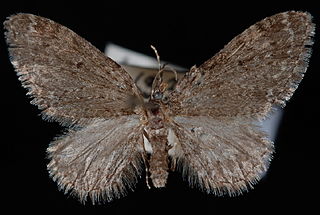
Eupithecia annulata, the larch pug moth, is a moth in the family Geometridae. The species was first described by George Duryea Hulst in 1896. It is found in North America from British Columbia north to the Yukon, east to Newfoundland and Labrador and south to California and Colorado.

Eupithecia olivacea is a moth in the family Geometridae first described by Taylor in 1906. It is found in North America from British Columbia south through Washington and Oregon to California.

Eupithecia gilvipennata is a moth in the family Geometridae first described by Samuel E. Cassino and Louis W. Swett in 1922. It is found along the North American Pacific coast from British Columbia, through Colorado to California and Arizona.
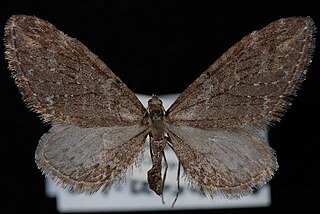
Eupithecia scabrogata is a moth in the family Geometridae first described by Pearsall in 1912. It is found in western North America from British Columbia to California and Arizona.
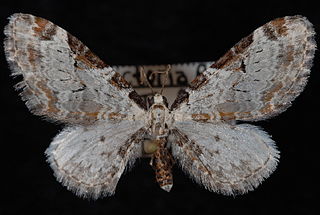
Eupithecia ravocostaliata, commonly known as the tawny eupithecia or great variegated pug, is a species of moth in the family Geometridae. The species was first described by Alpheus Spring Packard in 1876. It is found in northern New York and the New England states, extending across Canada from the Maritime provinces to Vancouver Island and down the west coast as far as the San Francisco Bay region.

















